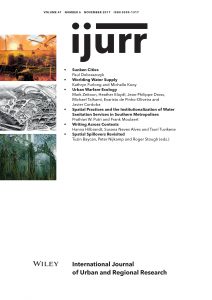Urban research has long related informality to a lack of state capacity or a failure of institutions. This assumption not only fails to account for the heterogeneous institutional relations in which informality is embedded, but has also created a dividing line between states. Whereas some states are understood to manage urban development through functioning institutions, others, in this view, fail to regulate. To deconstruct such understandings, this article explores informal practices through a multi-sited individualizing comparison between three case studies of water governance, parking regulation and dwelling regimes in Bafatá (Guinea-Bissau), Tallinn (Estonia) and Berlin (Germany), respectively. Our approach to understanding informality starts from the negotiation and contestation of order between differently positioned actors in the continuous making of states. From this point of view, informality is inherent in the architecture of states––emerging through legal systems, embedded in negotiations between and within institutions, and based on conflicts between state regulations and prevailing norms. Tracing how order takes shape though negotiation, improvisation, co-production and translation not only highlights how informality constitutes a modus operandi in the everyday workings of the state in all three cases, but also provides a way to talk across these cases, i.e. to bring them together in one frame of analysis and overcome their presumed incommensurability.
Details
Written by:
Hanna Hilbrandt, Susana Neves Alves & Tauri Tuvikene
Digital Object Identifier (DOI)
10.1111/1468-2427.12583
About DOI

